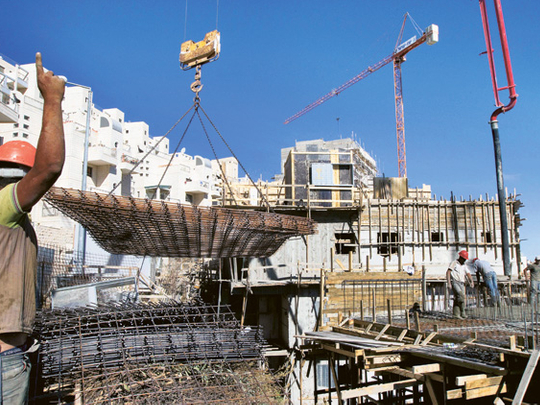
Ramallah: The US has admitted it failed to secure a new Israeli colony freeze, a Palestinian official said on Thursday, dealing a potential knockout blow to renewed peace efforts.
"The US administration has informed us that the Israeli government did not agree to a new settlement [colony] freeze," said the official, who spoke on condition of anonymity.
"The US administration will continue its efforts," the official added.
Chief Palestinian negotiator Saeb Erakat told AFP earlier Thursday that Palestinian president Mahmoud Abbas was to meet with US consul general Daniel Rubinstein in the course of the day.
The US consulate would not immediately comment.
A spokesman for Israeli Prime Minister Benjamin Netanyahu too had no comment but pointed out that the premier told the Knesset on Wednesday that Israel was "working closely with the United States... to find an effective route to resuming talks."
The United States has for weeks been trying to convince Netanyahu to impose a new moratorium on colony construction in the West Bank.
A previous 10-month freeze expired on September 26, shortly after the launch of new peace talks between Israel and the Palestinians, the first direct negotiations between the two sides in nearly two years.
The talks ground to a halt after the ban expired and colony building resumed.
Abbas later said he would not return to the negotiations without a new ban on Jewish construction on land the Palestinians want for their future state.
In an attempt to revive the talks, the United States offered Israel a package of incentives including 20 F-35 fighter planes, worth three billion dollars, in exchange for a new three-month ban.
Washington also committed that it would not seek an additional freeze, and pledged to provide Israel with diplomatic support, including vetoing anti-Israel resolutions at the United Nations.
The package would also have allowed Israel to continue building in occupied east Jerusalem, over the objections of the Palestinians, who want the annexed east part of the city for the capital of their future state.
Abbas has said any new moratorium must apply to building in east Jerusalem, a demand that Israel has rejected.
The idea of even a partial new freeze on West Bank colony construction is deeply unpopular among many in the Israeli parliament, including in Netanyahu's own cabinet.
On Wednesday, Israeli Foreign Minister Avigdor Lieberman told Israeli public radio he did not believe a new moratorium would be implemented.
"I think, like many others, that there will not be another freeze. We must erase the word freeze from our vocabulary," he said.
"We saw what the previous 10-month freeze got us - it didn't achieve a breakthrough in the negotiations," the chief diplomat said.
In early October, Abbas went to the Arab League to seek support for halting peace talks after Israel refused to extend the colony freeze.
The organisation said they would give the United States a month to try to salvage the talks but later extended the grace period until the end of November.
Arab foreign ministers said they would not set a date to meet on the issue again until the Palestinians received word from Washington about the outcome of its attempts to secure a new freeze.
How do you think this will affect peace talks? What should the next move be?












